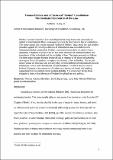Files in this item
Thomas Hobbes and a chastened 'global' constitution the contested boundaries of the law
Item metadata
| dc.contributor.author | Lang Jr., Anthony F. | |
| dc.date.accessioned | 2017-06-29T23:33:05Z | |
| dc.date.available | 2017-06-29T23:33:05Z | |
| dc.date.issued | 2016 | |
| dc.identifier | 231567737 | |
| dc.identifier | 63266428-3ac5-4339-afb4-e797796bee94 | |
| dc.identifier | 84955346186 | |
| dc.identifier | 000377025800007 | |
| dc.identifier.citation | Lang Jr. , A F 2016 , ' Thomas Hobbes and a chastened 'global' constitution the contested boundaries of the law ' , Critical Review of International Social and Political Philosophy , vol. 19 , no. 1 , pp. 103-119 . https://doi.org/10.1080/13698230.2015.1122357 | en |
| dc.identifier.issn | 1369-8230 | |
| dc.identifier.other | ORCID: /0000-0002-9159-4451/work/65014636 | |
| dc.identifier.uri | https://hdl.handle.net/10023/11118 | |
| dc.description.abstract | Hobbes’ account of politics, law and obligation has long been read, especially by realists in international affairs, as leaving no space for international law or institutions. This paper argues that a more nuanced reading of Hobbes’ ideas about law and politics provides support for not only a defence of international law but a defence of a (chastened) global constitution. Hobbes’ constitutionalism does not derive from a separation or balance of powers but on two other elements of constitutionalism: the importance of the individual and the centrality of law. The paper proceeds as follows: The first section locates Hobbes theory of law in relation to his theory of authority, drawing on David Dyzenhaus’s emphasis on the rule of law in Hobbes. The second section draws on theorists such as Larry May to find a defence of international law and institutions, what I call international constitutionalism. The third section turns to Richard Flathman’s interpretation of Hobbes as a theorist of liberal self-making, suggesting how his insights can be applied globally. The conclusion brings these thoughts to bear on the relevance of Hobbes for global law and politics. | |
| dc.format.extent | 349367 | |
| dc.language.iso | eng | |
| dc.relation.ispartof | Critical Review of International Social and Political Philosophy | en |
| dc.subject | Thomas Hobbes | en |
| dc.subject | Liberalism | en |
| dc.subject | David Dyzenhaus | en |
| dc.subject | Larry May | en |
| dc.subject | Richard Flathman | en |
| dc.subject | Global constitutionalism | en |
| dc.subject | JZ International relations | en |
| dc.subject | K Law (General) | en |
| dc.subject | B Philosophy (General) | en |
| dc.subject | BDC | en |
| dc.subject | R2C | en |
| dc.subject.lcc | JZ | en |
| dc.subject.lcc | K1 | en |
| dc.subject.lcc | B1 | en |
| dc.title | Thomas Hobbes and a chastened 'global' constitution the contested boundaries of the law | en |
| dc.type | Journal article | en |
| dc.contributor.institution | University of St Andrews. Institute of Legal and Constitutional Research | en |
| dc.contributor.institution | University of St Andrews. Centre for Global Law and Governance | en |
| dc.contributor.institution | University of St Andrews. School of International Relations | en |
| dc.identifier.doi | 10.1080/13698230.2015.1122357 | |
| dc.description.status | Peer reviewed | en |
| dc.date.embargoedUntil | 2017-06-29 |
This item appears in the following Collection(s)
Items in the St Andrews Research Repository are protected by copyright, with all rights reserved, unless otherwise indicated.

